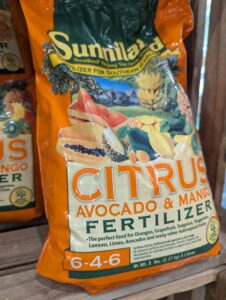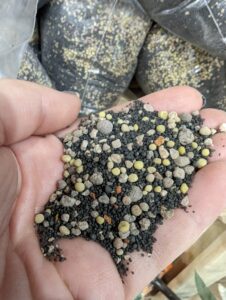It’s that time of year again when our landscape plants need a little pick-me-up to thrive and flourish. At Canterbury Farms Nursery & Garden Center, we believe that a healthy dose of knowledge combined with the right fertilizers can do wonders for your garden. So, let’s dive into the world of fertilizing and explore why now is the perfect time to give your plants a nutrient boost!
If you’re on a three-month fertilizing schedule, you’re right on track! This time of year is ideal for fertilizing as plants are actively growing and can make the most of the added nutrients. But before we jump into the how-to, let’s understand a few key terms like NPK numbers and mineral content.

The 6-4-6 numbers on this bag of Citrus fertilizer represent the NPK ratio of this fertilizer blend; i.e. 6% Nitrogen, 4% Phosphorus, 6% Potassium.
The Significance of NPK Numbers and Mineral Content
NPK numbers, also known as the fertilizer analysis, represent the ratio of essential nutrients in a fertilizer. N stands for nitrogen, which promotes healthy leaf and stem growth. P stands for phosphorus, which aids in root development, flowering, and fruiting. And K stands for potassium, which enhances overall plant vigor, disease resistance, and drought tolerance. For our area here in central Florida, it’s important to note that phosphates tend to be naturally high, so keeping an eye on the phosphorus content is crucial. Excessive phosphorus levels can have environmental implications, including potential water pollution. Therefore, it is advisable to avoid adding additional phosphorus unless a soil test confirms a deficiency. Instead, focus on selecting fertilizers with lower phosphorus content to maintain a balanced nutrient profile in the soil.
Apart from NPK, fertilizers may contain other essential minerals, including secondary macronutrients like calcium (Ca), magnesium (Mg), and sulfur (S), as well as micronutrients like iron (Fe), manganese (Mn), and zinc (Zn). These additional minerals play a vital role in supporting the overall health and growth of plants.
Proper Application of Fertilizer
Applying fertilizer correctly is crucial to maximize its benefits and minimize potential harm to plants and the environment. Here are some guidelines for proper fertilizer application:
- Soil Testing: Before applying any fertilizer, consider conducting a soil test to determine the nutrient levels in your garden. Soil tests provide valuable information about the existing nutrient content and pH levels, helping you make informed decisions about the type and quantity of fertilizer required. The Florida Institute of Food and Agricultural Sciences (IFAS) and the county Extension offices have a relatively new soil testing program that you can take advantage of. Contact your local office for more information:
- Pasco County Extension Office
- 36702 County Road 52, Dade City, FL 33525
- (352) 518-0156
- Hernando County Extension Office
- 16110 Aviation Loop Dr, Brooksville, FL 34604
- (352) 754-4433
- Pasco County Extension Office
- Follow Package Instructions: Read and follow the instructions on the fertilizer package carefully. The instructions will specify the recommended application rate, frequency, and method of application. Different fertilizers have varying release rates, so it’s essential to adhere to the manufacturer’s guidelines.
- Application Timing: Apply fertilizer when the plants are actively growing. We recommend to fertilize in late winter or early spring to coincide with the start of the growing season, again in early summer, and again in early fall. Avoid fertilizing during periods of drought or when heavy rainfall is expected; this helps to minimize nutrient runoff. Also avoid fertilizing in the late fall and through the winter in order to allow the plants to go dormant during this cooler time of year. Plants that push out new growth in the winter can be susceptible to more damage in a cold snap, as the new growth is extremely tender.
- Proper Distribution: Spread the fertilizer evenly over the root zone of the plants. For granular fertilizers, use a spreader or apply by hand, taking care to avoid concentrated piles or contact with foliage. Water the area thoroughly after application to aid in the absorption of nutrients into the soil.
- Avoid Over-Fertilization: More is not always better when it comes to fertilizers. Over-fertilization can lead to nutrient imbalances, plant stress, and environmental pollution. Follow the recommended application rates and avoid applying fertilizer near water bodies or in areas prone to runoff.

Our Canterbury Custom Fertilizer Blend contains a mixture of Milorganite and a 12-6-8 time-release fertilizer. The Milorganite helps provide a fast-acting boost of Nitrogen to the plants.
At Canterbury Farms Nursery & Garden Center, we understand the unique needs of Central Florida’s soil and plants. That’s why we stock a wide range of granular time-release fertilizers with appropriate NPK ratios and mineral content, including our custom blend of fertilizers that we mix up in-house that is perfect for all of your all-purpose plant fertilizing needs. Our knowledgeable staff is always here to assist you in finding the perfect fertilizer for your situation.
So, don’t delay! Head over to our nursery, grab that bag of granular time-release fertilizer, and give your landscape plants the love they deserve. Remember, a little boost of nutrients goes a long way in creating a vibrant and thriving garden. Happy fertilizing!
